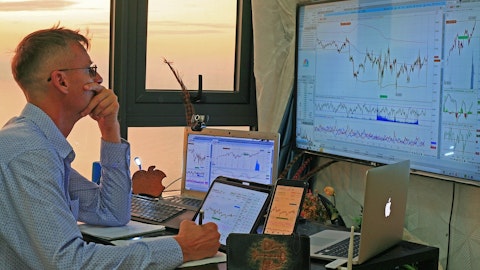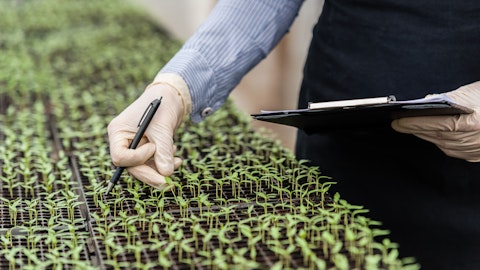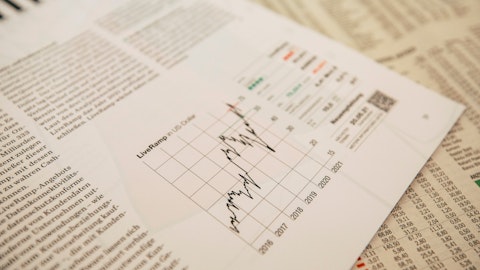Raviv Zoller: Yes. Keep in mind that in the second quarter, our mix to Europe is a little lower, so that sort of ticked prices up in the first quarter, our mix of sales.
Joel Jackson: Okay. So my final question is on polysulphate, which we’ve looked for over a decade. It’s something that you’ve really tried to push, and there’s reasons why maybe you don’t want to close the mine, pay reclamation costs. Maybe you want to see what happens with Sirius Minerals and now Woodsmith. The question I have is — a couple questions. One, is polysulphate losing money this year again? Assuming it is, at what point do you say the experiment’s over, we gave it a shot? And to what extent — we know what’s going on in the news with Anglo and Woodsmith and — to what extent would Anglo, either being bought or closing down Woodsmith, or which have closed down because it gets bought by someone else. To what extent would your decision on Boulby, Cleveland Potash to determine whether Woodsmith does get built or doesn’t get built?
Raviv Zoller: First of all, our assumption is that it doesn’t get built, to be honest, in the long run. Just the demand for the product is not enough to justify that kind of an investment. As far as we’re concerned, we’re looking at shorter term. We’re looking a few years down the road. And right now, as the product is about breakeven, which is disappointing. But it was very profitable in 2022, and it was marginally profitable in 2023. So we’re looking for ways to further go downstream and turn it into a viable, sustainable business. But to tell you that we’re 100% sure that it’s going to be part of ICL 10 years from now, I can’t say that yet.
Joel Jackson: Sorry. I’m being greedy. Following up on that, yes, they made money in 2022, Raviv, but that was when potash prices were three times higher and not sustainable. Right? So isn’t that sort of the answer to the question that after 10 years, does it make sense to go in with it? I mean, the other way to look at it would be, how can you — how much cash can you free up? Or how can you improve the balance sheet? Or how can the company be more simple if you did divest it or close it?
Raviv Zoller: The answer is yes and no, because in some regions in the world, it’s looked at for its commodity — for some of the commodity parts prices. But in other regions, and for example, in most of Europe, the product commands a premium because of its — it’s being organic and also specific attributes that create the additional yields and additional profitability. So I would say the product is very well received in Europe. It’s well received in some other regions, but it’s still very much a commodity outside of Europe and North America. In Europe, the market opportunity is still — that still exists is not that large. The opportunity in North America is larger. I would say, probably hundreds of thousands of tons, but not millions, like, something.
So yes, the price of potash, obviously, is very significant in crazy times like 2022, because then those that buy the product as a commodity are also willing to pay a lot. But in normal years, the question is how much of a premium can the product demand? And ICL has been very successful in penetrating with the product in Europe, less so in the U.S., just in terms of the amount of penetration we’ve actually achieved. But the product is doing very well and the customers are very happy. So I do see a future for the product. But to tell you that we’ve made a final decision, the burden on the cash flow is relatively negligible. It doesn’t move the clock on ICL.
Joel Jackson: Thank you very much.
Raviv Zoller: Thank you.
Aviram Lahav: Thank you.
Operator: Thank you. You have no further questions. Please proceed.
Raviv Zoller: Okay. So with that, thank you very much for participating in our call this quarter. We’re happy to report to you on our progress and looking forward to reporting again next quarter. Thanks again to all of ICL employees for their great contribution. And we appreciate our shareholders and their trust in us. Thank you very much and take care.
Operator: Thank you.
Follow Icl Group Ltd. (NYSE:ICL)
Follow Icl Group Ltd. (NYSE:ICL)
Receive real-time insider trading and news alerts




